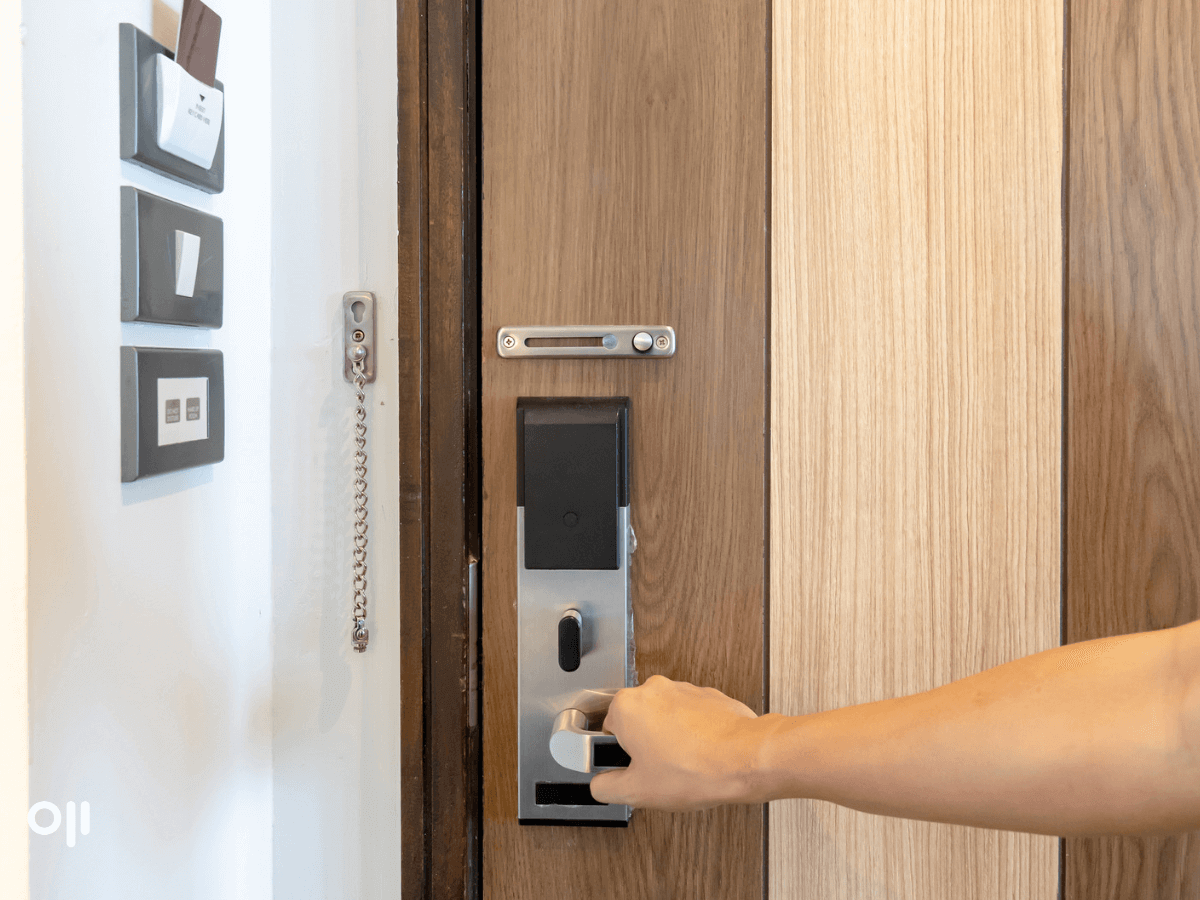Hotel Door Lock: Choose the Best One

In the hospitality industry, ensuring security has always been a paramount concern. Traditional key-based locks, however, are no longer viewed as the most secure option due to the inherent risk of keys being lost or found, leading to unauthorized access. Additionally, the expense and time-consuming nature of lock replacement further underscores the necessity for more sophisticated alternatives. As such, adopting advanced technologies like electronic door locks can offer a more secure, practical, and cost-effective solution.
Modern electronic door locks, also referred to as electric locks, have become increasingly prevalent in the hotel industry. They offer various methods of access including PINs, chip cards, fingerprint recognition, or smartphone applications. If you’re considering investing in a cutting-edge lock system for your business, the following guide provides invaluable tips and insights to help you make an informed decision.
Understanding Electronic Hotel Door Lock Systems
A key advantage of smart door lock systems is their user-friendly nature, particularly when guests can conveniently gain room access with a single tap on an app.
Exploring Types of Hotel Guest Room Locks and Keys
Choosing a lock system requires careful thought, including considerations such as whether the lock requires a stable Wi-Fi connection to function. With such systems, you can manage security remotely, enhancing convenience.
The myriad options available on the market can be overwhelming. To aid your decision-making process, we’ve compiled comprehensive information on the most popular lock types in the hospitality industry, outlining their general characteristics, along with pros and cons.
Mechanical Door Locks
These are simple locking systems with various lock cylinder mechanisms, including reversible or spanner keys. Despite being affordable and easy to install, these locks can be easily picked and may not provide the necessary convenience for elderly or disabled guests. Owing to these drawbacks, traditional keys are increasingly less common in the hospitality industry.
Mechatronic Locking Systems
These systems amalgamate mechanical and electronic components, merging the benefits of traditional and digital locks to enhance your building’s security. They don’t require complex wiring installations as the power source is in the key, which contains a battery that can be easily replaced after a year of use. If the system has a Bluetooth connection, it can provide real-time updates on access to the building or specific rooms.
Electronic (Digital) Locking Systems
Digital locks are the pinnacle of modern locking options. They require electricity to operate, hence necessitating cable installations. These locks offer a multitude of functions such as programmed locking and unlocking times. They can even be opened via a smartphone using Wi-Fi or Bluetooth.
Types of Electronic Locks:
RFID Locking System
Radio-frequency identification (RFID) uses electromagnetic waves for identification. This system is widely used in hotels as the code cards can be reprogrammed for each guest.
PIN Code Lock
These locks can be opened by entering a sequence of digits on a keypad or touchpad.
Chip Card Lock
These locks use a sensor and a chip card, which can be easily reprogrammed and offer convenience for guests and hotel staff.
Smartphone Controlled Lock
This system is relatively new and allows room access using Bluetooth technology or Wi-Fi, enhancing the guest experience.
Understanding, Installing, and Maintaining Your Digital Hotel Lockset
While digital locks offer a plethora of advantages, their operation, installation, and maintenance can be challenging to understand at first glance. Here, we address common queries to help you effectively manage your investment in digital lock technology:
Installation Process: With detailed instructions provided with each lockset, even a hotel’s maintenance team can handle the installation.
Maintenance Guidelines: Regularly check battery conditions, clean locks from dirt and dust, avoid sudden door slams, and monitor the overall door condition. Issue. They can be reprogrammed easily and offer convenient usage for guests and hotel staff.
Advantages:
-Convenience for multiple users;
-Easy to pass the card on;
-Ability to reprogram the card with ease.
Disadvantages:
-There’s a risk of misplacing or losing the card.
The Lock with a Smartphone Control
This locking system controlled via a smartphone app is a relatively new innovation. It allows users to gain access to rooms or apartments using Bluetooth technology or Wi-Fi. The possibilities and functions are endless! For instance, you can notably enhance customer experience by combining the Mobile Check-In option with the ability to unlock the door using a smartphone. This feature saves your guest’s time and eliminates the need to queue at the reception. These locks can easily be integrated with your current Property Management System. The only drawback is that guests must always carry smartphones with them and ensure the battery is charged.
Advantages
- Potential for expedited Check-in;
- Integration with PMS;
- Simple door opening with a mobile device;
- Various app functionalities.
Disadvantages
- Requires wireless connection;
- Dependence on smartphone availability and battery life.
Regardless of the numerous advantages that door locks with digital keys present, many aspects might not be immediately clear. How does it function? Is it secure? How to install and maintain your digital hotel lockset? For those contemplating investing in this kind of technology, we’ve compiled a concise list of answers to some commonly asked questions:
How to install a digital hotel door lock?
If your hotel employs a maintenance team, your staff will be able to handle this task without any issues. Each lockset comes with detailed installation instructions, so with the appropriate tools, almost anyone can install it.
Mostly, there’s no need to wire each door as smart hotel door locks are battery-powered. The basic steps are nearly the same as installing a traditional lock. Here’s a probable sequence of actions for setting up your new device:
Step 1: Remove the previous lockset.
Step 2: Install the new keyless system as per the manufacturer’s instructions.
Step 3: Fit in the exterior components of the lock, such as the strike plates and the door handle.
Step 4: Input the passcode on the keypad.
Step 5: Set up the app and configure the lock to allow smartphone controls.
These are generic guidelines, and the specifics of installation always rely on the lock type and model. However, it’s worth noting that choosing a retrofit smart lock is the easiest way to upgrade your door as it doesn’t require replacing your old deadbolt system entirely. If you don’t have a maintenance team on-site, you can hire a locksmith, with labor rates usually ranging from $50 to $100.
How to maintain keyless hotel door locks?
The rules for maintaining a digital entry system are fairly straightforward and are akin to those for any other electronic device. If you want your new locks to function efficiently for an extended period, here’s what you should do:
- Regularly monitor the battery condition and replace or charge them if they are running low.
- Clean the locks to remove dirt and dust by gently wiping them with a soft cloth.
- Avoid abrupt door slams and prevent the use of excessive force.
- Purchase appropriate cleaning products for your appliances.
- Regularly inspect the overall door condition and promptly repair any damages.
How to issue a digital key for hotel locks?
You can generate a digital key for an electronic door directly from your HotelFriend Property Management System. You can send a digital key to anybody who has a smartphone, eliminating the need to distribute a physical key. For instance, to issue such a key to your guests via email, you just need to click the ‘Send Door to read the whole passage and get to the next part. I’ll make the first part more engaging and better structured. Here is the edited version:
Navigating the Use of a Digital Key
The convenience of keyless hotel entries has been a game-changer in the hospitality industry. With just your smartphone in close proximity to the lock reader, access is granted with ease. Here is a more detailed illustration, using the Salto KS system as an example:
Approach the lock and ensure your device’s Bluetooth is activated.
Launch the HotelFriend Concierge or Salto KS application and tap the “Digital Key” button located at the bottom right corner of the screen. The app will then relay the digital key to the lock.
Bring your smartphone in contact with the lock reader. Upon hearing an audible sound and seeing a positive LED signal, you’re good to step into the room.
Alternatively, you can enter a PIN code into the Salto KS App and hit “Unlock” to open the door.
Crafting a PIN Code for Your Smart Lock
The process of creating a numerical code varies based on the lock model. It could either be done directly on the lock’s keypad or within its associated application. A guest-friendly option would be allowing guests to establish their own sequence of numbers – a combination easy to remember yet hard for intruders to guess. This PIN code adds an extra layer of security against unauthorized access.
The Functionality of Smart Hotel Locks During Power Outages
While each hotel has its distinct lock system, most smart locks are battery-powered, providing an independent power source. Therefore, even when there’s a power outage in the hotel, the locks continue to function normally. Such batteries are usually long-lasting, providing several years of service. And, with timely replacements, you can ensure uninterrupted operation.
Moreover, smart locks come with a built-in backup battery that lasts for several days. Devices such as VingCard and Saflok have the added benefit of being operable with a special remote control if the batteries fail, offering extra power to the lock so you can enter the code.
The Auto-Lock Feature in Electronic Hotel Doors
The auto-lock feature’s availability varies based on the lock type and the manufacturer. Some smart locks have the capability to lock the door if it remains open for a specified duration. This auto-lock function can be toggled on or off within the app, and you can also adjust the time frame after which the door will automatically lock. Additionally, some locks can be configured to lock themselves as soon as they’re closed. It’s advisable to consult with your lock provider to understand the availability of such features.



Leave a Reply
Want to join the discussion?Feel free to contribute!